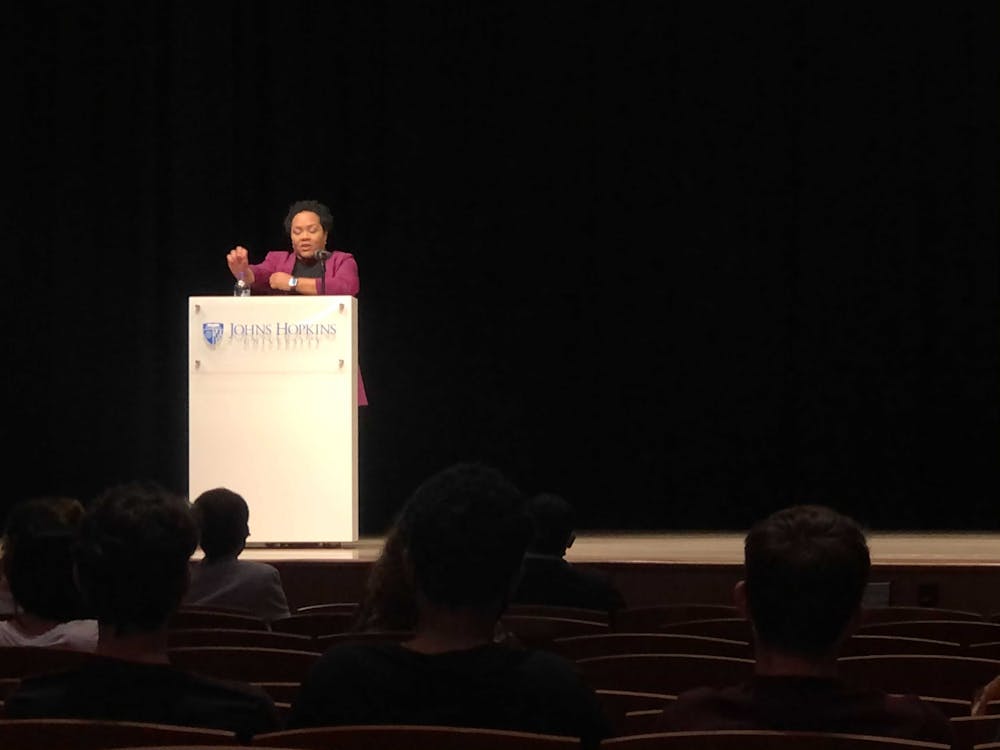Is it the media’s job to ensure that the public believes in facts? Not according to Yamiche Alcindor. Alcindor, a White House correspondent for PBS NewsHour, moderator of Washington Week and political contributor for NBC News and MSNBC, spoke at Hopkins on Wednesday, Oct. 7 about her career covering social justice and politics as a part of the Milton S. Eisenhower (MSE) Symposium’s 2021 speaker series “Rebuilding Our Future.”
In an email, MSE Symposium Co-Chair of Programming Husain Hakim told The News-Letter that the group invited Alcindor to share her views on how the media has been involved in political opinion.
“In an era of unprecedented political polarization and misinformation, we thought the Hopkins community would really benefit from hearing the perspective of Yamiche Alcindor... on how the news media can fight against misinformation and positively contribute to the political landscape,” he wrote.
Alcindor talked about how journalism can serve as a means for social change. She decided to pursue journalism in order to stir up “good trouble,” alluding to an op-ed the late Congressman and civil rights activist John Lewis wrote shortly before his death.
“Said differently, journalism is my calling, and it's how I have decided to chip away, in both small and large ways, at injustices that are still faced by people all over the country,” Alcindor said.
She drew parallels between the lynching of Emmett Till in 1955 and the murder of George Floyd by Derek Chauvin in 2020, arguing that each served as wake-up calls for its generation.
It was lyrics written by Kanye West that first introduced Alcindor to Till’s story, and she said that the image of his open casket pushed her to pursue journalism.
“If you look up images of Emmett Till, you cannot look away... and his face called out to me to be a professional witness,” Alcindor said. “I wanted to be the person who took that picture. I wanted to be the person who was asking his mother, why did you make this decision [to have an open-casket funeral]? I wanted to be a civil rights journalist who was asking the hard questions and who is bringing hardships to America.”
Additionally, Alcindor highlighted how her family background has informed her work. She explained that her mother, a social worker, taught her to approach people and problems without judgment.
“She ended up teaching me what it means to have a hard work ethic but also what it means to be empathetic to people who don't have the same set of circumstances as you,” she said. “Out of all the things that I've learned about journalism, it comes down to my immigrant Haitian mom, who would go to people's homes and ask them how she could help.”
In an interview with The News-Letter, Senior Carl Urbanik noted that he came to hear Alcindor speak after enjoying Latosha Brown’s lecture at last week’s MSE Symposium.
“I came as a continuation, to learn more about different perspectives, what everyone else has to say about their life story, how they got there,” he said.
During the question and answer session, Alcindor was asked to share some particularly memorable interviews from her career. She pointed to a conversation that warned of the power political leaders wield in spreading misinformation.
“I interviewed a girl who had four family members on ventilators in Chicago. She said, ‘The president didn't tell us that it was that big of a deal,’” Alcindor said. “Often in the White House, we're wondering, what is the president's messaging? Is it really bad for people?”
An attendee asked Alcindor about the role of journalists in shaping the public’s trust in media.
“You know, journalists focus so much on sort of a distrust of media, but when you look at polling, people don't trust the government, and they don't trust scientists — there's like a general [distrust] of the whole entire system,” she said. “I think that some people are just gonna believe what they believe.”
Alcindor also argued that giving both sides equal weight in a story does not necessarily equate to responsible journalism, especially when one side is not based in fact. She cited the climate change debate and argued that equating deniers and climate change experts in an article would not be a fair representation of the truth of the issue.
She criticized the way news in the U.S. tends to center national issues as the most important stories regardless of what is happening around the globe.
“I don't know if there's an argument for the debt ceiling actually being the number one story in the world today,” Alcindor said. “It's the number one story that we're covering, but I don't know if there's nothing going on in Ethiopia that's more important right now.”
Alcindor concluded by giving advice to students interested in journalism. She explained that breaking into the industry is difficult, so new reporters should expect to apply to many newsrooms and not be picky when it comes to jobs.
“Be willing to go anywhere. When my internship was done with The Washington Post, no one was trying to hire me, and I ended up applying for a job at Newsday in Long Island... I hated it,” she said. “That's what you have to do to do [journalism].”
Junior Zeeshaan Chunawala told The News-Letter that he attended in order to build on his earlier college experiences with visiting speakers.
“My freshman year I used to go to these talks by the Alexander Hamilton Society, and they had famous people come and speak. I thought I'd come to something like this too,” Chunawala said.
The next event in the MSE Symposium’s 2021 series features Benjamin Crump, the lawyer representing the family of Henrietta Lacks and Floyd. He will speak in Shriver Hall on Tuesday, Oct. 12 at 7 p.m.
Marvis Gutierrez and Min-Seo Kim contributed reporting to this article.

















